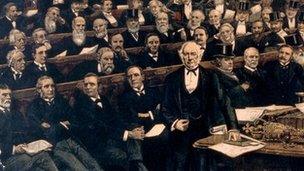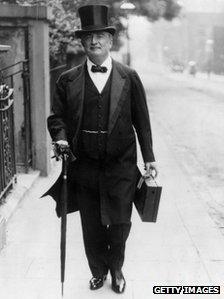Home Rule and the Ulster Covenant
- Published

Prime Minister William Gladstone famously declared that his "mission was to pacify Ireland"
The Prime Minister and the Taoiseach are opening a Westminster exhibition on the Third Home Rule Bill on Monday. Our Political Editor Mark Devenport examines the significance of the 1912 bill which triggered the Ulster Covenant.
In the 1870s Irish politicians such as Isaac Butt and Charles Stewart Parnell pressed for "Home Rule"; the creation of an Irish parliament with responsibility for Irish domestic affairs.
They won the backing of the great Liberal Prime Minister William Gladstone, who famously declared before forming his first government that his "mission was to pacify Ireland".
Gladstone introduced his First Home Rule Bill in 1886 but it divided his party and was defeated in the House of Commons.
In 1893 a Second Home Rule Bill made its way through the Commons, but was thrown out by the House of Lords. The strength of the Conservatives and Liberal Unionists in the Lords meant the second chamber constituted an apparently insuperable barrier.
In 1911 the Liberals, with the backing of John Redmond's Irish Parliamentary party, changed the rules so that the Lords could no longer veto a measure passed by the Commons.
Redmond held the balance of power in the Commons and in April 1912 the Liberal Prime Minister Herbert Asquith introduced his Third Home Rule Bill.
German rifles

John Redmond held the balance of power in the Commons
Asquith's bill would have created a two chamber parliament in Dublin, and substantially reduced the number of Irish MPs sitting in Westminster. The bill passed into law, but never came into effect as it was over taken by events.
The introduction of the Third Home Rule bill triggered the drafting of the Ulster Covenant, signed by more than 500,000 unionists in September 1912. Signatories pledged to use "all means which may be found necessary to defeat the present conspiracy to set up a Home Rule parliament in Dublin".
In January 1913 unionists set up the Ulster Volunteer Force pledging to resist the bill by force of arms. Later that year, nationalists responded by creating the Irish Volunteers. In April 1914 the UVF imported thousands of German rifles - the Irish Volunteers acquired a smaller quantity.
The outbreak of the First World War in August 1914 changed everything. Both sides to the dispute swelled the ranks of the British army, in the belief that their loyalty would eventually be rewarded. The Third Home Rule Bill became law, but its practical introduction was suspended until after the end of hostilities. But then came the Easter Rising, Sinn Fein's victories in the 1918 election, the formation of the First Dail and the War of Irish Independence.
Lloyd George replaced the Third Home Rule Bill, now in law as a suspended Act of Parliament, with a fourth Bill. This entered law as the 1920 Government of Ireland Act - the law which created a separate parliament for Northern Ireland.